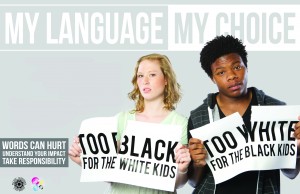This story was originally published in The Mooring Mast of Pacific Lutheran University on October 3, 2014. It was written by PLU guest writer Genny Boots.
My Language My Choice is taking to the streets of Pierce, Thurston and King counties.
The passive poster campaign that began at Pacific Lutheran University is teaming with Clear Channel Communications to release a “Words Can Hurt” public service announcement. There will be 112 billboards around the Puget Sound area spotlighting the My Language My Choice (MLMC) challenge: to accept personal responsibility for your words.
In 2012, Diversity Center director Angie Hambrick and designer Lace Smith began a poster campaign focusing on everyday derogatory language with funding from a grant by the Seattle Pride Foundation.
The posters feature PLU students, staff and alumni ripping through the word or phrase of their choice.
The project started with “That’s so gay,” “Bitch” and “Illegal” and has grown to include “Exotic,” “Retarded” and “Ghetto” to name a few. These words and phrases are examples of “micro-aggressions.”
Micro-aggressions are regular sayings that are derogatory and insulting despite the intent.
Taking responsibility for personal language, becoming cognizant and beginning the conversation are the integral steps to the MLMC campaign.
It caught on. With over 200 Facebook shares and 6,000 notes on Tumblr, the wave of social media attention kept MLMC flourishing.
During the 2013-14 school year, MLMC partnered with the Women’s Center, the PLU Athletic department and the local school district to develop specialized editions.
These days it’s rare to find a notice board on campus that doesn’t have a poster about MLMC. What Hambrick and the Diversity Center started doesn’t seem to be slowing down anytime soon.
The campaign’s success is credited to student leaders. “Whether it was in your res hall, the D-Center, your team, your classes, people took responsibility. Saying ‘Hey, I’m choosing not to say this. Whatever you do, is up to you, but I’m choosing not.'” Hambrick said.
Now, as the billboards start to go up, the conversation is spreading.
The billboards have been donated by Clear Channel, on a space-available basis. They are printed on fully recyclable “Eco-posters” and will be located on major secondary arterial roads. The boards will be up for the full academic year, and will be located in the South Sound.
There seems to be no stopping this campaign. From cork boards to billboards, universities around the country have applied the MLMC format for their own communities.
Even as the MLMC campaign sets its sights to a national level, it will carry on here at PLU.
“Wherever you find community on campus, I hope you have these conversations,” Hambrick said.
And that’s where it all starts. A conversation.

